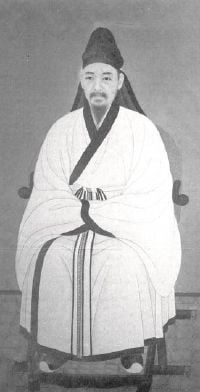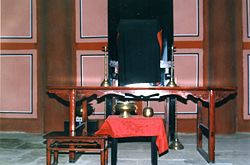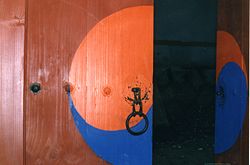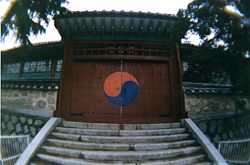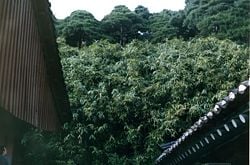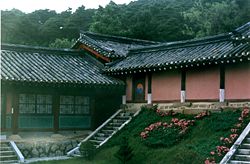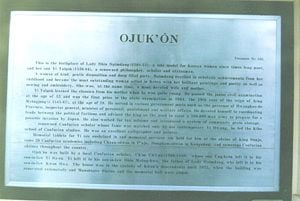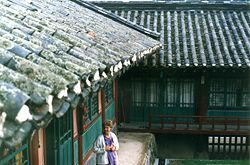Yi I
- This is a Korean name; the family name is Yi.
| Yi I | ||||||||
|---|---|---|---|---|---|---|---|---|
| ||||||||
| Pen name | ||||||||
| ||||||||
| Courtesy name | ||||||||
|
Yi I (1536-1584), known as "Yulgok" according to his pen name, which means ("Chestnut valley"), is as prominently recognized as Yi Hwang T'oegye (1501-1570). The two lived in the same period and they met in 1558 when T'oegye was at the peak of his notoriety. However T'oegye recognized the talent of the young scholar, remembering Confucius's words that you should respect young people for what they may become in the future. T'oegye and Yulgok exchanged letters and when the Master who just completed "The Ten Diagrams of Sage Learning" passed away, Yulgok expressed in a moving way his admiration for this gentle figure who had showed a very profound research and an exemplar right behavior within difficult circumstances.
T'oegye is much more known for having developed Zhu Xi's Thought in Korea and set the path of Korean Neo-Confucianism leading the reflection on specific questions like the mind-and-heart in his famous "Four-Seven Debate." He is maybe the most studied Korean philosopher internationally since 30 years, and in 2001 on his 500 years birth anniversary an important international gathering took place in Andong in his honor. Yulgok is less known although he is very admired by the Koreans. The first major conference on Yulgok took place in 1984 in the Academy of Korean Studies, Seoul, to celebrate the 400th anniversary of his death.
Background
Yulgok came from the area of Kangnung on the Eastern coast near the Eastern sea below the mountain ranges of the Kangwon area. These landscapes had a profound impact on Yulgok who always loved the infinity of the sea and the steep, rocky cliffs as it is reflected in many of his poems.
Yulgok crossed a relatively short life of 48 years at a high pace, exhausting his strength by an intense research and a tireless dedication to the nation. When he died he was quite poor, like Confucius, but the king stopped his activities for three days to grieve for him. At the moment of his death King Sonjo (1567-1608) had named him again minister of home affairs. Yulgok previously had served as minister of home affairs (1581), minister of justice (1582), and minister of defense (1583).
Sonjo grieving for Yulgok remembered well the Songhakchipyo or "Anthology of Wisdom Learning" that Yulgok wrote for him in 1575 to guide him in his duties of a young king. This enormous work is the quintessence of the Confucian wisdom accompanied by remarkable philosophical insights of Yulgok.
As the Western approach often draws a clear distinction and separation between roles and fields, from the early history Asians have developed flexible relations between politics, philosophy and arts. Consequently Yulgok was not just a brilliant statesman, he was a philosopher, a poet and an educator. He had furthermore interests in medicine, economy, military affairs, having already a kind of encyclopaedic mind. That is why he he was admired by the Korean Sirhak scholars like Yi Ik and Tasan in the eighteenth8 and nineteenth centuries.
Yulgok's Early Quest
The role of a mother is often important in the maturation of a great man. The mothers of both Confucius and Mencius are famous in Asia. In Korea Shin Saimdang remained exemplar for having guided her son in education, the classics, poetry, calligraphy but also for her own creativity for example in painting. As the father of Yulgok was often on duty in Seoul, a special mother-son bond developed, and when in 1551 Yulgok suddenly lost his mother it was a terrible shock.
At the age of 15 he had already absorbed the majority of the Confucian classics but now he was facing the reality of death. According to the Confucian tradition he stopped all activities to mourn for his mother during three years. In his deep sadness he went to the Diamond Mountains, kumgangsan and intensely meditated and read numerous texts of Neo-Confucianism, Zen Buddhism and Daoism. In 1554 he went further and felt attracted by Buddhism. He chose to have the experience of Zen meditation and monastic life for one year.
From that period Yulgok kept an open mind that was not usual among Korean Neo-Confucians. It is known that Koreans have a stronger sense of orthodoxy than the Japanese and even the Chinese. Although Yulgok was a Neo-Confucian he complained that many scholars had lost the true Confucian spirit. He was ready to recognize other thoughts like those of Daoism and Wang Yang-ming, which was not accepted at that time.
Similarly to Ch'oe Ch'i-won in the ninth century, Yulgok was in fact looking for the highest truth, for grasping more about the mystery of life and death, about the mystery of man and of the cosmos. He went as far as he could in Buddhist meditation but realized that he had some duty to fulfill in his life, especially in relation to the improvement of society. That is what influenced him to come back to the secular world in 1556. After numerous hesitations he chose the Confucian way and wrote his famous "Letter of Resolution." In his new beginning he emphasized the importance of setting the will, ipchi, concept which he kept throughout his life. The human will is a crucial philosophical problem, and without it one cannot reach any accomplishment, which became essential for Yulgok, either Self-accomplishment or social accomplishment.
Philosophical Point of Departure
The point of departure of thinking was for Yulgok nature, the cosmos, that is why his philosophy is called sometimes a philosophy of the qi, vital energy. Yulgok has been presented as a materialistic thinker, which is not correct. To develop a true appreciation of Yulgok one needs an accurate understanding of Neo-Confucianism and a precise reading of Yulgok's works. Some schools of Neo-Confucianism gave emphasis to the li/i principle dimension of existence while limiting or neglecting the concrete life. Yulgok, while emphasizing reality qi/ki, wanted to keep the value of principles. Furthermore he was looking how to harmonize these two dimensions expressed by i and qi that one finds in spiritual and material; mind and body.
Yulgok manifested the strength of his thinking at the young age of 22 in 1558 with two works that have been praised in China. These works both show an intense experience of nature, the profound meditation in relation to Buddhism and Taoism and an extraordinary knowledge of Confucian classics, and in particular of the Yi Jing ("Book of Changes.")
The Ch'ondo ch'aek or Essay on the Tao of Heaven is a philosophical meditation with poetic accents on what is moving all beings and is bringing harmony within the universe.
"The action of the eminent Heaven cannot be heard or smelt. Its principles are hidden but its symbols are clear. Everyone who understands this is able to speak about the Tao of Heaven." [1]
The Yoksu ch'aek or "Essay on the Changes" and the numbers combines Yulgok's knowledge of the Chinese classic and his profound ontological experience. Yulgok was fascinated by the changes at work in the universe. Beyond all the commentaries existing on the Yijing he wanted to reach the mind of the first sages who composed this classic. He wanted also to pierce the relation between man and the cosmos.
"Heaven and Earth are waiting for a sage and then show him the numbers. The sage waits for the writings and then presents to people the principles. Heaven cannot but make rise a sage and cannot but transmit to him the writings. Such is the natural correspondence. The communication between Heaven and man is very subtle." (Yoksu ch'aek)
In this work he expressed his longing for the unity underlying the relation of the two main forces at work in the universe that one one finds in various concepts as the yin-yang, qian-kun, li-qi.
"A unique principle unites, two qi/ki evolve. The immensity of the universe and the che change of all beings, nothing is done without the mysterious relation between the li and the qi."(Yoksu ch'aek)
Regularly Yulgok wrote poetry on nature not just to express aesthetic emotions but to convey philosophical impressions that are not always easy to say through pure concepts. That is why the study of his poems is fruitful to understand his philosophy.
- "During a winter solstice evening at midnight, the yang starts moving.
- It is difficult to express the mysterious dimension of Heaven's heart.
- When the earth shakes at the sound of thunder,
- Kindle a new fire in the middle of the night
- And stay without falling asleep,
- Silently thinking of the mysterious foundation." [2]
For Yulgok what is basic in the universe remains hidden but at the same time on a closer consideration it is clearly manifest. There exists a deep correspondence between the world of essence and the world of phenomena. This onto-metaphysical research for him was not foreign to an ethical quest. The East has never disconnected Ontology and Ethics.
In the Eastern context Yulgok used the concepts of T'aiji/Taeguk to give account of the Great Foundation but he said that that was an expression one should not be limited by.
- "All things come back to the unity of the Five Elements.
- The Five Elemenets come back to the unity of the Yin-Yang.
- The Ying-Yang come back to the unity of the T'aijii/T'aeguk.
- The T'aiji/T'aeguk is a name that one could not avoid giving.
- Its essence is the change, its principle is the Tao
- and its application is the spirit." [3]
- "All things come back to the unity of the Five Elements.
Aiming at the roots of the heart in the universe and in man
The more we read Yulgok the more we are exposed to the various leitmotifs of his thought: Unity, mysteriousness, interrelation of unity and diversity, sincerity.
That is why Yulgok's Thought cannot be oversimplified as a realism or as an idealism. Yulgok embraces both aspects of the human condition, the practical aspect which requires seriousness in the cultivation of one's person and in taking responsibility in all the daily activities of life, but also the highest aspirations of the mind and heart. Often people concentrate on one aspect and neglect the other. Harmonizing the two is a difficult task which required the efforts of a whole life.
Mind-heart is at the core of Yulgok's Thought. Besides Plato and Pascal the heart has not been emphasized as a philosophical question in the West and Paul Ricoeur said that a "philosophy of the heart" had yet to be found. On the reverse all the traditions of Confucianism, Taoism and Buddhism, that Yulgok knew very well, researched, cultivated and spoke of the heart. Therefore, to Yulgok the origin of the universe is one, even if its manifestations are many, the universe is centered and points in the direction of heart. Man is the heart of the universe and responds to an invisible and mysterious heart as he put it in the above poem.
In developing a substantial heart, man comes into harmony with Heaven which moves the whole universe through real principles and in this mysterious relation of creativity emerges a world of real accomplishment. In order to contribute to such a world man has to start from enlightenment, from the “getting oneself”"chaduk," as Yulgok liked saying, in order to develop his knowledge and straighten his heart, to set his will to cultivate himself in order that not only the individual but also family and society emerge within the context of wisdom.
- “Heaven works through real principles and all things are fruitful.
- Man through a real mind-and-heart moves all things.
- This real principle and this true mind and heart are nothing else than sincerity.” [4]
T’oegye focused more on the concept of reverential respect, kyong/jing in his philosophy, either in epistemology or cultivation of the Self as it is visible in his "Ten Diagrams" 's reflection. Yulgok, although he recognized the importance of reverential respect as a starting point and as an attitude, built his philosophy centered on sincerity (authenticity, substantially), song/cheng which was always underlined in Eastern Thought like in "The Doctrine of the Mean."
Today the concept of sincerity is weak but it may be one of the reasons that we cannot solve important problems. On the contrary nature and Heaven do not change in giving and caring for all beings. That is why the reflection on sincerity in the East goes back to the early times. For example in the Yi Jing Book of Changes one finds:
- "The profound man separates himself of what is false
- and protects the sincerity.” [5]
And Zhou Doun-I, the founder of Chinese Neo-Confucianism in the eleventh century said:
- “Sincerity is the foundation of wisdom.” [6]
In Korea Yulgok is probably the philosopher who went the further in the reflection on sincerity and later the practical thinkers Yi Ik and Tasan took him very seriously. In the above quotation the real/true principles, "silli," of Heaven and the real/true mind-heart, "silsim" of man are nothing else than sincerity is a powerful statement of Yulgok. On one hand it says that the ontological source of thinking and deciding is sincerity. On another hand it lets us see that the aim of understanding and acting is a true and authentic fulfillment.
The universe is true reality and in correspondence man must reach a true accomplishment at all levels of the Self, of the family, of the nation and of the world.
Yulgok's poems do not express the joyful peace and experience of the divine at the contact of nature like In T'oegeye's poems, they present some sadness and torments. Although nature purifies and calms the mind, the tragedy of human beings and the corruption at work in the human heart could not be forgotten by Yulgok. Two years before his death Yulgok wrote in 1582 an essay on what he perceived as a deviation from the original heart and that causes to hurt the original nature and proposed to give all the strength to avoid such deviations.
- "The person who masters his mind-heart, when a thinking is being born in him, if he realizes that
- such a thought comes from the mind-heart of the Tao, immediately will extend it and make it substantial.
- But if he realizes that it comes from the mind-heart of man, he will examine it carefully and guide it
- according to the mind-heart of the Tao." [7]
Toward an Accomplished Society
In the last ten years of his life Yulgok wrote and accomplished remarkable things which have not yet been fully appreciated. It is like he worked even harder for Koreans to open the eyes to realities and to commit themselves.
In his Mamonpongsa, Treatise of Ten Thousands Characters of 1574 Yulgok showed that people often avoid deep direction and efforts, being driven by the research of money, power and fame. He defended a program of socio-political reforms in the direction of more equality and justice in consideration of lower classes. He listed the different problems blocking the reforms. His reflection presented the important point that one should not change for the sake of changing but evaluate the appropriate time not by opportunism but for the deepest purpose. There are things to be changed at a certain time but there are times that one should not change things.
The following year in 1575 Yulgok presented to the king his voluminous Anthology of Wisdom Learning. This is an impressive work which is not quickly absorbed. It symbolizes the comprehensive dimension of Yulgok's Thought. Yulgok wanted to think the whole man. Therefore, he introduced all the major Confucian thinkers, he guided in the different methods of reading and exploring the classics. And he covered systematically all the major points of the cultivation of the Self, the correction of the family and the art of governing. He encouraged the discovery of many treasures of wisdom and warned about the weaknesses and dangers that one encounters in oneself and meeting others and situations. All way through he brought light and inspiration on a great variety of subjects in a way that remains pertinent today. Toward the end of his essay he astonishingly remarked that too may meet people who accomplish great things at the individual and family levels but that no nation has yet accomplish substantial results, and that what saddened Confucius in his life time.
Yulgok did not cease to write major works until his death in 1584: in 1577 his Essential instructions of Kyongmong covering many subjects of Confucian life, in 1581 A diary of lectures before the throne, Kyongyon ilgi, a sharp and critical essay on historical and political matters that shaken Koreans even today, in 1582 his Model School, Hakkyo mobom showing his concern for a true development of young people and in 1583 his Six articles reform essay, defending his reforms in economy, politics and society and showing the importance of readiness in defense.
In 1583 Yulgok was minister of defense. He is well-remembered for his foresight about the national security. He proposed then to draft and raise 100,000 men against possible Japanese attack. Rejected by central government, his worry was found to be well-founded soon after his death, when Hideyoshi Toyotomi's Japan's Korea War: First Invasion (1592-1596) Japanese forces invaded Korea in 1592. The "Yulgok Project," a recent modernization project for the South Korean military, was named after him.
According to a legend, he had a villa built near the ford of the Imjin River in his lifetime and instructed his heirs to set it ablaze when the king had to flee northward from Seoul, to provide a guiding beacon. This took place during Hideyoshi's Invasions of Korea in 1592. (see Battle of the Imjin River (1592))
In conclusion, at this time of drastic changes in Korea and in the world we still need, beyond the centuries, the remarkable guidance of Yulgok because if external changes bring the necessary well-being of people, can they be achieved at the cost of internal development? True wisdom brings harmony within the Self for the benefit of others.
- "If one practices with all one's strength one can reach efficiency and then obtain results.
- Holding together knowledge and action, uniting what is internal and external
- one enters the grounds of wisdom." [8]
- "Without sincerity one cannot establish one's will; without sincerity one cannot reach
- the deep understanding of principles and without sincerity one cannot change
- one's physical disposition." [8]
Notes
- ↑ Yulgok, Ch'ondo ch'aek (Essay on the Tao of Heaven).
- ↑ Yulgok's Poetry, "Writing one's inmost thoughts on a winter solstice evening."
- ↑ Yulgok, Yoksu ch'aek (Essay on the Changes).
- ↑ Yulgok, Song ch'aek (Book on Sincerity).
- ↑ "Commentary of the First Hexagram" Yi Jing.
- ↑ Zhou Doun-I, Reflection on the Changes, Chapter I.
- ↑ Yulgok, Insimtosimto, (Essay on the mind-heart of the Tao and on the mind-heart of man).
- ↑ 8.0 8.1 Yulgok, Songhakchipyo.
ReferencesISBN links support NWE through referral fees
- An, Pyong-ju. "Yi I (Yulgok) and His Thought." In The Korean National Commission for UNESCO, ed. Main Currents of Korean Thought. Seoul: The Si-sa-yong-o-sa Publishers, Inc., 1983/Arch Cape, OR: Pace International Research, 1983.
- Chung, Edward Y. J. 1995. The Korean neo-Confucianism of Yi Tʻoegye and Yi Yulgok a reappraisal of the "Four-Seven Thesis" and its practical implications for self-cultivation. SUNY series in Korean studies. Albany: State University of New York Press. ISBN 9780585090948
- De Bary, William Theodore, and JaHyun Kim Haboush. 1985. The Rise of Neo-Confucianism in Korea. Neo-Confucian studies. New York: Columbia University Press. ISBN 9780231060523
- Deuchler, Martina, and JaHyun Kim Haboush. 1999. Culture and the state in late Choson Korea. Cambridge, MA: Harvard University Press. ISBN 9780674179820
- Thiebault, Philippe. "Yi I, Yulgok (1536-1584), A path to maturation and fulfillment, poetry, philosophy and wisdom," Royal Asiatic Society, Korea Branch, Transactions volume 74 (1999): 59-85.
External Links
All links retrieved May 24, 2023.
- Sven Herbers-Lee Yulgok Yi I (1536-1584).
Credits
New World Encyclopedia writers and editors rewrote and completed the Wikipedia article in accordance with New World Encyclopedia standards. This article abides by terms of the Creative Commons CC-by-sa 3.0 License (CC-by-sa), which may be used and disseminated with proper attribution. Credit is due under the terms of this license that can reference both the New World Encyclopedia contributors and the selfless volunteer contributors of the Wikimedia Foundation. To cite this article click here for a list of acceptable citing formats.The history of earlier contributions by wikipedians is accessible to researchers here:
The history of this article since it was imported to New World Encyclopedia:
Note: Some restrictions may apply to use of individual images which are separately licensed.
